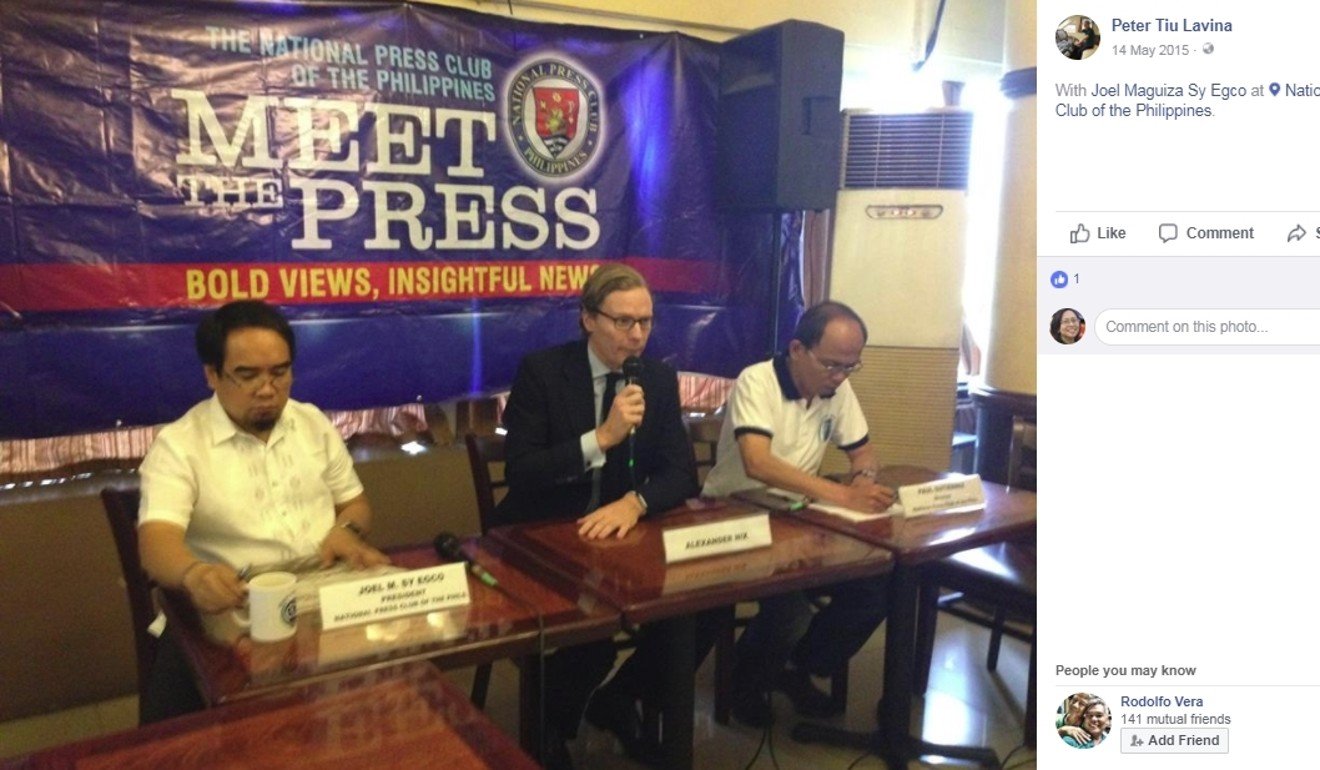
Cambridge Analytica boss Alexander Nix dined with two of Rodrigo Duterte’s campaign advisers in 2015
Nix and his companies have come under fire for using data harvested from Facebook, which recently revealed that some 1.2 million Filipinos on Facebook were affected by the data breach
When Alexander Nix, the recently suspended boss of Cambridge Analytica, went to Manila in May 2015, he did more than deliver a talk on his new method of managing elections.
Nix dined with Jose Gabriel “Pompee” La Viña and Peter Tiu Laviña, cousins who later played key roles in Rodrigo Duterte’s presidential campaign, notable for its use of social media. At the time, Nix identified himself as a board director of Cambridge Analytica’s parent company, Strategic Communications Laboratories (SCL).
Peter snapped photographs of Nix’s talk at the National Press Club (NPC) in Manila and his meal at the club’s dining room, and posted them on his Facebook page. Also present on that occasion were NPC president Joel Sy Egco – now Undersecretary at the Presidential Communications Operations Office or PCOO – and Taipan Millan, a lawyer and family friend of Duterte.
Six months after that meal with Nix, both cousins were among those who convinced Duterte to run for president. Duterte appointed “Pompee” La Viña as his social media director – a first in Philippine election history – and Peter Laviña as his campaign spokesman.
Sources who worked on the campaigns of Duterte’s two rival candidates told the South China Morning Post they had never met nor heard of Nix or SCL.

The source who worked on the presidential campaign of Senator Grace Poe said he was not aware of any contact from Nix or SCL. The source, who spoke on condition of anonymity for lack of authority to comment, added: “We used our own social media strategy.”
Ibarra Gutierrez, the spokesman for Mar Roxas, the ruling party contender, said the same.
“[The campaign had] no organised effort to the extent others were utilising social media,” he said. “The focus of the campaign was traditional organising of local political allies at the grass roots level.”
He laughed off recent accusations from Duterte supporters that it was Roxas and not Duterte who was the unidentified client of SCL in the Philippines. SCL had previously posted on its website it had managed elections for a male politician in the Philippines, who it recommended be rebranded into a tough crimebuster. This post has since been removed but archived copies remain.
I’m not sure who [Alexander Nix] is. I attended one forum at the NPC where a foreigner was resource speaker. Can’t recall if it was this guy you are mentioning
Gutierrez said they had neglected to use social media because “we simply underestimated its impact on the elections”. He explained they based their strategy on a survey that indicated Filipinos got 70 per cent of their news from television.
Duterte won the election, although without a majority of votes. Roxas was a distant second, closely followed by Poe.
Basking in post-election glory, Pompee La Viña credited “Duterte social media warriors” for the win. He could not be reached for comment for this story.
However, his cousin, Peter, denied – via Facebook Messenger – the Duterte camp had contracted Nix or SCL for the election.
“We never had any foreign help during the campaign,” Peter Tiu Laviña said.
Asked how many times he met Nix, he replied: “I’m not sure who he is. I attended one forum at the NPC where a foreigner was resource speaker. Can’t recall if it was this guy you are mentioning.”
He did not reply whether this was the only time he had met this foreigner.
The “intervention” of foreigners and foreign entities in Philippine elections is a criminal offence. But to be punishable, such meddling has to occur during the campaign period, according the Commission on Elections (Comelec) regulations.
Nix and his companies have come under fire for using data harvested from Facebook, which recently revealed that some 1.2 million Filipinos on Facebook were affected by the data breach.

